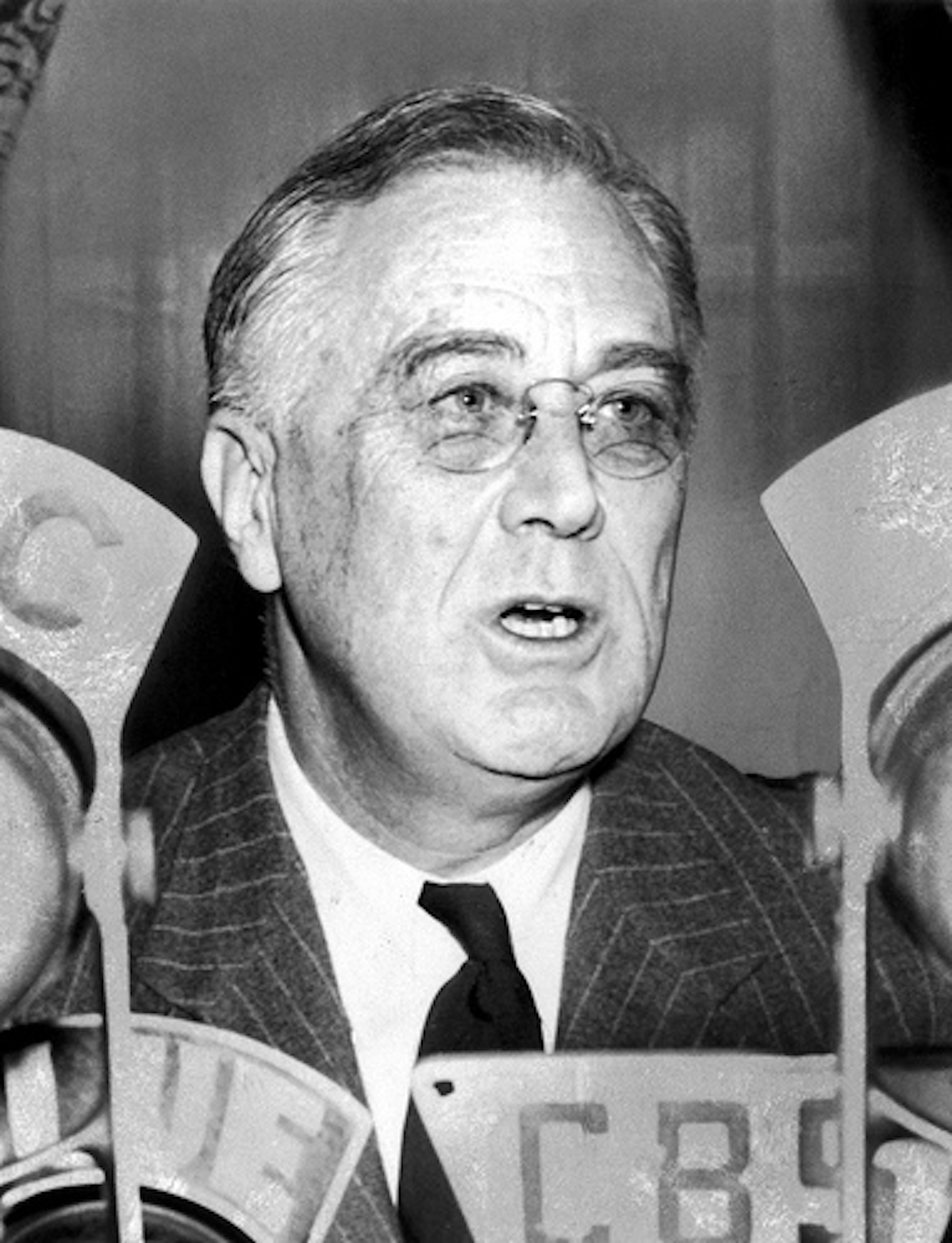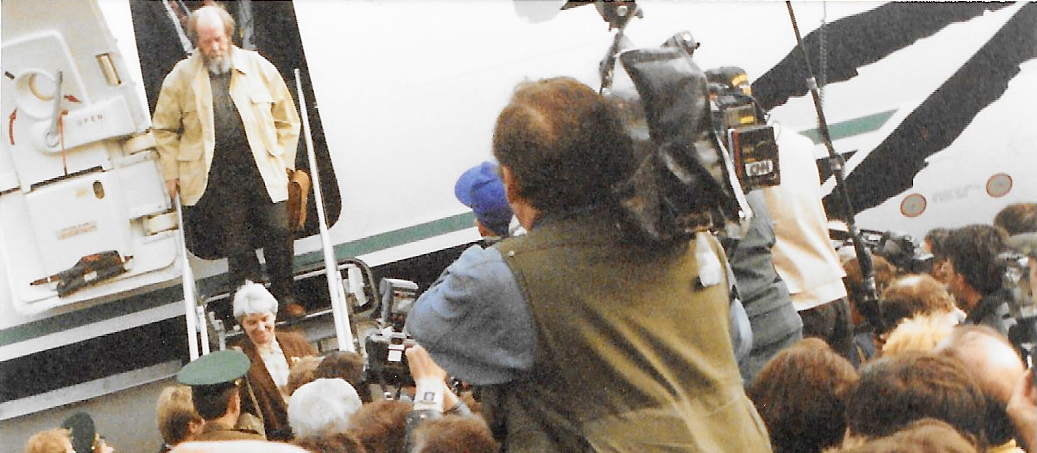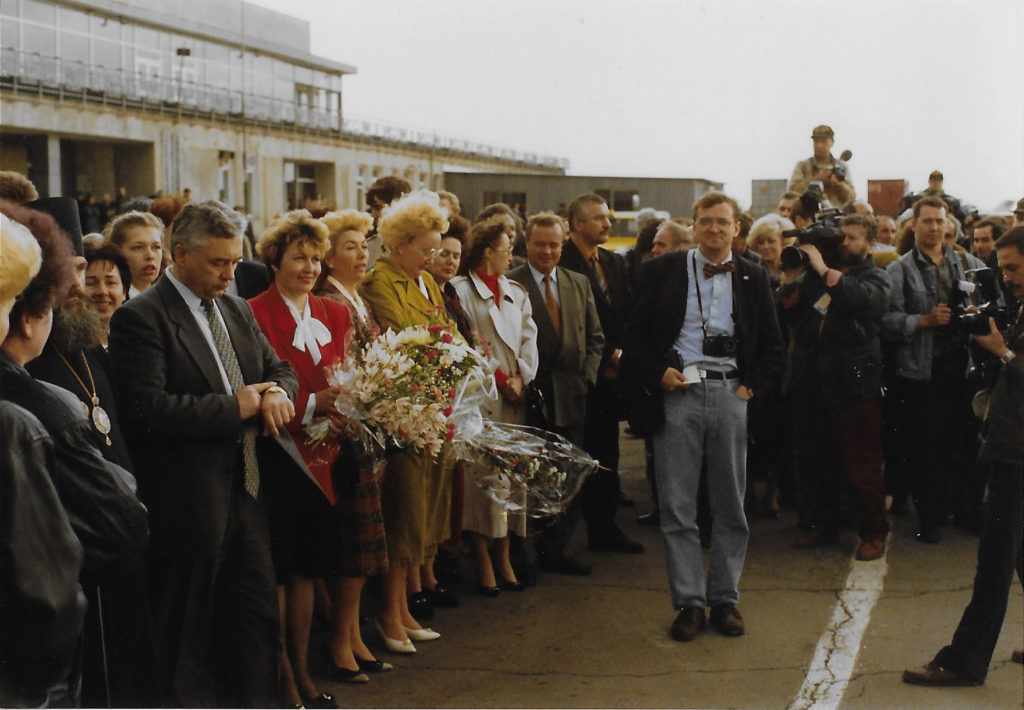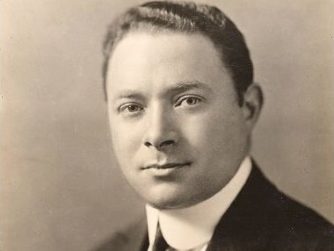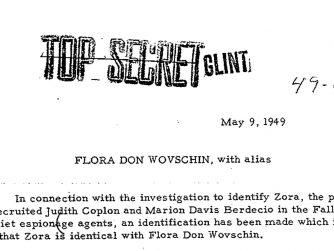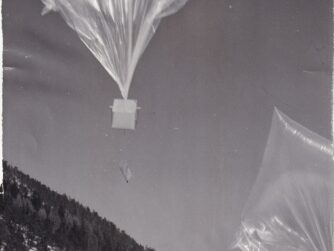OPINION
How Voice of America Censored Solzhenitsyn
Brief History of VOA’s Domestic Propaganda
By Ted Lipien
The Voice of America (VOA) was an easier target than Radio Free Europe (RFE) or Radio Liberty (RL) for U.S. government bureaucrats wanting to restrict human rights broadcasting to the Soviet Union in 1974 as part of the Nixon-Ford-Kissinger policy of détente. These efforts by top U.S. officials were in themselves a major victory for Soviet propaganda even if they turned out not to be completely successful. Soviet leaders, diplomats and propagandists managed to convince Secretary of State Henry Kissinger and Presidents Nixon and Ford that Russian Nobel Prize-winning author of The Gulag Archipelago Alexandr Solzhenitsyn was somehow an enemy of détente and ought to be ostracized in the West, and not just in the Soviet Union and countries under Moscow’s domination.
By that time, February 1974, the Soviet leadership had already forced the writer into exile and deprived him of his Soviet citizenship. In the end, U.S. government’s attempts at censorship, however, were largely limited to federally-funded overseas broadcasts of the Voice of America, from which Solzhenitsyn was banned for a number of years in the 1970s. The U.S. government ban had no direct effect on private American media, over which the Nixon and Ford administrations had no influence as far as their own coverage of Solzhenitsyn was concerned. All American journalists, however, were targets of Soviet propaganda and disinformation campaign which eventually negatively affected most of American media’s reporting on Solzhenitsyn. Some of the false labels attached to him by the KGB started to appear with greater frequency in U.S. media reports as he continued his life in exile in the United States from 1976 until 1994.
The Soviet propaganda victory was significant but not complete. As a result of pressure from the U.S. administration, Solzhenitsyn was banned by VOA, but not to any large degree by RFE or RL. Unlike RFE and RL, pro-Soviet propaganda and censorship of enemies of Soviet communism had a long tradition at the Voice of America. It went back to World War II and the Office of War Information (OWI) where the Voice of America originated in 1942. From its very beginning, VOA was also an integral part of the U.S. federal bureaucracy, while RFE and RL, although initially funded and managed by the CIA, and after 1972 overseen by the presidentially-appointed Board for International Broadcasting (BIB), were not within any federal government agency. They were headquartered in Munich, West Germany, thus removing them even further from the reach of overzealous U.S. government officials.
During World War II, U.S. government propaganda and censorship were not only designed to influence foreign audiences. They were also used by officials of the OWI in charge of the Voice of America to deceive Americans at home. By 1974, when the Soviet government expelled Solzhenitsyn from the country of his birth, VOA was already prohibited by law since 1948 from engaging in any attempts to influence domestic public opinion in the United States. That was not the case for VOA during World War II.
President Roosevelt specifically selected Elmer Davis for his OWI role because he wanted him to use his popularity as a domestic radio broadcaster to help deliver the White House message directly to Americans.
A memorandum from President Roosevelt to Elmer Davis, dated November 20, 1942, described want the president wanted him to do for American radio audiences in addition to any broadcasts abroad by what became known later as the Voice of America.
THE WHITE HOUSE
MEMORANDUM FOR HONORABLE ELMER DAVIS
November 20, 20142
Here is another one who seeks your voice [in the United States].
F.D.R.
Enclosure
Transmitting memorandum which the President
received from Honorable Harry L. Hopkins under date of
11/19/42, regarding – “What would you think
of Elmer Davis giving a weekly summary of the
war news over the air? I think the public have
confidence in Davis. He has an excellent radio
voice. It is possible we could get all stations
in the United States to carry it. He would
make the news interesting.”[ref][/ref]
Elmer Davis did as he was asked. He began recording weekly broadcasts for both the Voice of America and American radio networks at home. One of his commentaries for American radio listeners and for VOA audiences overseas was a lie (he claimed after the war he did not know it was a lie) in support of Soviet propaganda claims on the murder of several thousand Polish military officers in Katyń.
Shortly after assuming his government position, Davis also proceeded to try to censor foreign language press in the United States. They included Polish American newspapers and radio stations that were beginning to report on the fate of Polish deportees in Russia and correctly blamed Stalin for the Katyń executions.
In a December 23, 1942 memo to Attorney General Francis B. Biddle, Davis called for a U.S. government action against Polish American newspaper Nowy Świat. The paper’s only crime was reporting news about Stalin and the Soviet Union that the Roosevelt administration did not want Americans to read. Nowy Świat was also critical of OWI propaganda in the U.S. and VOA broadcasts in Polish and other languages.
The enclosed translation of material appearing in the Polish newspaper Nowy Swiat seems to this office sufficiently serious to call for some action, if that can legally be taken.[ref]
[/ref]
The Office of War Information also produced propaganda films for domestic consumption, including documentaries justifying the illegal internment of American citizens of Japanese ancestry on the orders of President Roosevelt. The future Democratic Senator from California, Alan Cranston, was one of the officials at the OWI in charge of providing U.S. government propaganda to American newspapers and radio stations. He was the strongest supporter of government censorship directed against newspapers and radio stations that criticized the Soviet Union. In a memorandum to OWI director Elmer Davis, dated January 7, 1943, in preparation for a meeting with the U.S. Attorney General Francis B. Biddle on foreign language press, Cranston made a strong bid for shutting down American newspapers which did not want to toe the administration’s line in support of the war and U.S. allies. These war allies included Russia, but also smaller nations such as Poland and others not wanting to be dominated by the Soviet Union or having their territory annexed by Russia after the war.
I feel that at tomorrow’s meeting with the Attorney General Biddle we should strongly advise that the worst of these papers be suppressed or barred from the mails immediately.[ref]
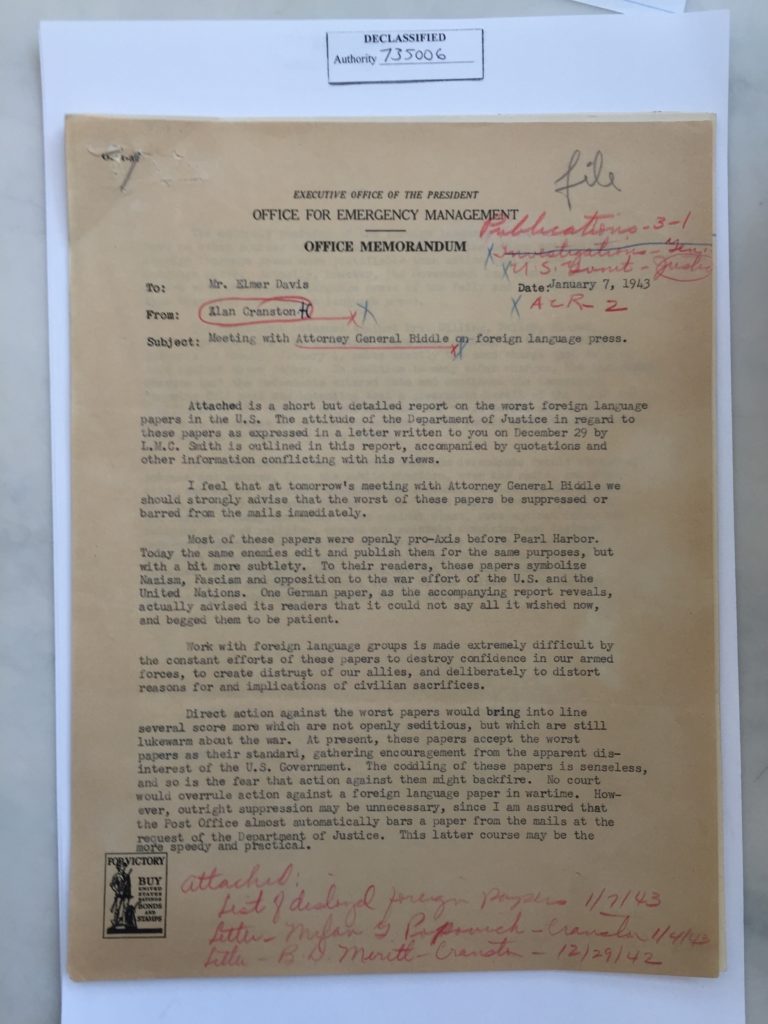
[/ref]
The only specific reference in the Cranston memo was to German-language papers published in the United States. He described them as symbolizing “Nazism, Fascism and opposition to the war effort of the U.S. and the United Nations.” But the real target of Cranston’s attack, as seen in other memos from that period, were Polish American papers, which could hardly be accused of any pro-Nazi sympathies as Poland was then under German occupation. They supported the war with Germany but were at the same time strongly critical of the Soviet Union. Since by 1943, the German American newspapers would hardly dare or even want to support Hitler and oppose the war with Germany, Cranston’s memo applied largely to other ethnic newspapers.
Direct action against the worst papers would bring into line several score more which are not openly seditious, but which are still lukewarm about the war.
Later in his memo, Cranston added:
The coddling of these papers is senseless, and so is the fear that action against them might backfire. No court would overrule action against a foreign language paper in wartime.
Cranston informed Davis that the U.S. government had not paid sufficient attention to foreign language press in the United States.
The monopoly position of the foreign language press — many readers have no other sources of information — should make action against the foreign language press more justifiable than action against the English language press.
In 1943, domestic propaganda and censorship activities of the then VOA’s parent federal agency, the Office of War Information, prompted Rep. Joe Starnes (D-AL) to issue a warning that Americans don’t need a government-run domestic propaganda agency which also engages in censorship.
“Censorship of the press and colorization of the news on domestic policies by a centralized Government agency will blanket the fires of freedom burning on the hearthstones of our people.” “I repeat,” Rep. Starnes added, “America needs no Goebbels sitting in Washington to tell the American press what to publish or the American people why we are at war.”[ref]Joe Starnes, “The Work of the O.W.I., Congressional Record, July 1, 1943.[/ref]
Rep. Joe Starnes was one of many members of Congress demanding a ban on spending of taxpayers’ money by the Executive Branch to propagandize to Americans. During the war, the Congressional Record became one of the main repositories of American protests, statements and newspaper articles condemning Soviet aggression against democratic nations and exposing Soviet propaganda in support of such aggression. The Congressional Record was then the true “voice” of America; the Voice of America was not. Operating within the wartime U.S. mega-propaganda agency, it engaged in unrelenting support for the Soviet Union and its war aims, most of which were in opposition to American values and interests.
VOA’s pro-Stalin propaganda included covering up of Soviet crimes, such as the execution murder on the orders of Stalin of thousands of Polish POW military officers and other Polish officials, which became known as the Katyń Forest massacre. Katyń is mentioned briefly by Solzhenitsyn in The Gulag Archipelago as a Soviet crime although he did not become a Gulag prisoner until after the war.
The U.S. Congress continued to pay close attention to the Voice of America. Members of a bipartisan investigative committee of the House of Representatives were especially harsh in their 1952 report in condemning censorship of American media and censorship of news about Soviet crimes in VOA’s overseas broadcasts during and after the war.
Furthermore, members of the staff of both OWI and FCC did engage in activities beyond the scope of their responsibilities. This unusual activity of silencing radio commentators first came to light in August 1943 when the House committee investigating the National Communications Commission discovered the procedure.
The technique utilized by staff members of OWI and FCC to silence was as follows: Polish radio commentators in Detroit and Buffalo broadcasting in foreign languages after the announcement of the discovery of the mass graves of Polish officers at Katyn reported facts indicating that the Soviets might be guilty of this massacre.
In May 1943 a member of the FCC staff suggested to a member of the OWI staff that the only way to prevent these comments was to contact the Wartime Foreign Language Radio Control Committee. This committee was made up of station owners and managers who were endeavoring to cooperate with the OWI and FCC during the war years. Accordingly a meeting was arranged in New York with two of the members of this industry committee. They were specifically requested by the OWI staff member to arrange to have a Polish radio commentator in Detroit restrict his comments to straight news items concerning Katyn, and only those by the standard wire services. The fact that a member of the FCC staff attended this meeting is significant because the FCC in such a case had no jurisdiction. In fact, the FCC member was in New York to discuss the renewal of the radio license of one of these industry members. The owner of the radio station in Detroit was contacted and requested to restrict the comments of the Polish commentator on his station, and this was done.
By applying indirect pressure on the station owner, these staff members accomplished their purpose, namely, keeping the full facts of the Katyn massacre story from the American people. (See vol. VII of the published hearings.) Office of Censorship officials testified and supported the conclusion of this committee that the OWI and FCC officials acted beyond the scope of their official Government responsibilities on this matter of Katyn.
Testimony before this committee likewise proves that the Voice of America-—successor to the Office of War Information-—had failed to fully utilize available information concerning the Katyn massacre until the creation of this committee in 1951. The committee was not impressed with statements that publication of facts concerning this crime, prior to 1951, would lead to an ill-fated uprising in Poland. Neither was it convinced by the statements of OWI officials that for the Polish-Americans to hear or read about the Katyn massacre in 1943 would have resulted in a lessening of their cooperation in the Allied war effort.”[ref]”The Katyn Forest Massacre. Final Report of the Select Committee to Conduct an Investigation of the Facts, Evidence and Circumstances of the Katyn Forest Massacre pursuant to H. Res. 390 and H. Res. 539, Eighty-Second Congress, a resolution to authorize the investigation of the mass murder of Polish officers in the Katyn Forest near Smolensk, Russia,” (Washington D.C.: U.S. Government Printing Office, 1952), accessed October 26, 2017, https://babel.hathitrust.org/cgi/pt?id=osu.32435078695582.[/ref]
Similar condemnations of VOA’s censorship of Alexandr Solzhenitsyn were heard in the U.S. Congress in the 1970s.
Censorship–activities against U.S. media during World War II eventually contributed to the OWI’s demise in 1945 and to enacting a law restricting domestic distribution of VOA programs. Repeatedly exposed and condemned in Congress by both Democrats and Republicans, wartime U.S. government propaganda and censorship activities prompted the passage of the 1948 Smith-Mundt Act. It severely limited domestic dissemination of VOA broadcasts, required strict security clearances for VOA employees and gave preferences to hiring U.S. citizens. In 2013, Congress relaxed some of the restrictions on domestic distribution of VOA programs, raising fears that VOA officials and journalists could once again engage in partisan domestic propaganda, which indeed happened in 2016.
Based on previous behavior of former officials in charge of the Voice of America, fears of VOA-generated domestic propaganda are not unfounded. There was a widespread concern in Congress during and after World War II that Voice of America broadcasters, blinded by Soviet propaganda and sympathetic to the Soviet Union, were using American tax money to promote Soviet interests at the expense of U.S. interests. The same bipartisan congressional committee led by a Democrat, Rep. Ray Madden (D-IN), concluded in 1952 that these charges were essentially true. The committee blamed Roosevelt administration officials, including those in charge of VOA, for ignoring and damaging longterm U.S. national interests, even if some of their decisions may have seemed justified at the time by wartime policy objectives.
The committee also disclosed that ideological preferences and biases of VOA officials and journalists played a crucial role in their pro-Soviet propaganda during the war and even for a few more years after the war.[ref]Ibid.[/ref] The 1948 Smith-Mundt Act, also known as the U.S. Information and Educational Exchange Act of 1948 (Public Law 80-402), was designed to eliminate such bias and to prevent the Executive Branch, including VOA journalists, from propagandizing to Americans. It was not designed specifically to prevent internal censorship in VOA programs targeting foreign audiences, as Alexandr Solzhenitsyn found out in 1974 when VOA Russian Service journalists were forbidden by Nixon and Ford administrations officials to try to interview him or to allow him to read from The Gulag Archipelago for radio listeners in the Soviet Union. The management of the Voice of America enforced this ban and placed its own severe restrictions on VOA’s foreign language services. Most of them lasted until the Reagan administration took office in 1981.
The next several Cold War Radio Museum articles will examine these events and provide a historical perspective and rich documentation from the Congressional Record and from previously classified U.S. government documents on how the censorship of Solzhenitsyn by the Voice of America was part of a larger pattern of Soviet propaganda influence going back to World War II. Hopefully, they will also offer some lessons for today’s propaganda wars being waged against the United States by Russia, China, Iran, North Korea, and ISIS.
Russian Propaganda and U.S. Politics
Radio Liberty Fails on Russian Interference
The Obama “Reset” with Russia
Brief History of VOA’s Domestic Propaganda
China, Iran, Cuba, North Korea
Main article for “How Voice of America Censored Solzhenitsyn” Cold War Radio Museum Exhibit in November 2017:
SOLZHENITSYN Target of KGB Propaganda and Censorship by Voice of America
Chapters
Solzhenitsyn – Target of Red Propaganda
Censorship at the Voice of America – A Historical Background
Decision to Ban Solzhenitsyn from VOA
Political Fallout for President Ford
Fallout for VOA Managers During Reagan Years
Criticism in Congress
VOA Foreign Broadcasters Against Institutional Censorship
Solzhenitsyn Criticizes VOA and Radio Liberty in 1982
A Partial Reconciliation with VOA
Solzhenitsyn Records for VOA
KGB, Solzhenitsyn and U.S. Media
Another Solzhenitsyn Reading on VOA
Conclusions
Photos: (Top) Alexandr Solzhenitsyn and his wife Natalia Dmitriyevna Solzhenitsyn exiting from Alaska Airlines plane upon their arrival on May 27, 1994 in Vladivostok as they returned from exile in the United States.
(Bottom) Local Russian officials and VOA reporter Ted Lipien awaiting the arrival of Alexandr Solzhenitsyn in Vladivostok on May 27, 1994. VOA had no plans for on-the-ground coverage of Solzhenitsyn’s arrival in Russia, but Ted Lipien and VOA Russian Branch Chief Sherwood Demitz who were in Vladivostok on a marketing trip to promote rebroadcasting of VOA programs by local radio stations sent in a report to Washington.
Disclosure: Ted Lipien was VOA acting associate director in charge of central news programs before his retirement in 2006. In the 1970s, he worked as a broadcaster in the VOA Polish Service and was a reporter and service chief in the 1980s during Solidarity’s struggle for democracy in Poland. He is one of the co-founders and supporters of BBG Watch whose volunteers monitor management and performance of taxpayer-funded Voice of America and other U.S. government-run media operations within the Broadcasting Board of Governors.


